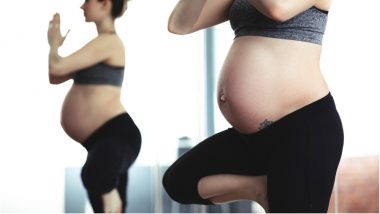Exercising plays a vital role for a healthy lifestyle. This stands true even when you are pregnant. Apart from the nutrition you provide your unborn child, exercise is one of the best ways to give your baby a healthy start in the womb. A new research conducted by the Technical University of Madrid has discovered that exercise can also positively impact on how long an expectant mother spends time in labour. The study was carried out with 508 healthy women by dividing them into two groups – control group and exercise group. Those in the exercise group were given a moderate aerobic exercise programme. The researchers concluded that the expectant mothers who were active in aerobic workouts spent less time in labour than the woman who hadn’t.
Exercising during pregnancy also help mothers restore their fitness after giving birth. They get back in shape quickly and avoid putting on extra weight during pregnancy which could be fatal for both mother and baby. Below are some exercise routines every mum-to-be should follow during pregnancy.
Best Exercises for a Healthy Pregnancy
Walking: It is one of the best cardiovascular exercises for pregnant women. Walking keeps you fit without jerking your knees and ankles. It can be done anywhere and at any time of the day. It also doesn’t require any equipment other than a pair of supportive shoes and is safe to do throughout all nine months of pregnancy. Make sure you are stay hydrated and protect your skin with a generous application of sunscreen. Also, as you enter in your second and trimester, your belly will grow bigger. You need to keep a constant check on your posture, to avoid any strain on your back. Keep walking in intervals and keep a steady pace.
Swimming: Many fitness experts recommend swimming as it is the safest form of exercise for pregnant mothers. It is ideal as it exercises your large muscle groups like arms and legs. It helps you feel weightless despite all the extra pounds you’re carrying. It is especially helpful for women with lower back pain. The water will keep you from overheating and will keep your body cool. It will also help relax your body and keep your mind calm.
Aerobics: Aerobic exercises strengthens your cardiovascular system (the heart, lungs and blood vessels) and tones your body. With a strong cardiovascular system, you won’t tire easily and will have abundant energy. Join pregnancy aerobic classes where you’ll enjoy the camaraderie of other mums-to-be and will feel reassured. Light-weight aerobic exercise will also help you maintain a good posture. Hydration is again a key when doing aerobics. Stop working out the moment you feel tired, don’t wait till the point of exhaustion.
Yoga: Prenatal yoga classes are a big hit among the expectant mommies. Yoga improves flexibility, balance and circulation during pregnancy. It is also beneficial because you will learn the right techniques of deep breathing and consciously relax. Staying calm during labour and not being afraid of pain is crucial during delivery. When you’re in pain or afraid, the body produces adrenalin and may produce less oxytocin, a hormone that makes labour progress. A regular yoga practice will help you resist the urge to tighten up when you feel pain and make it easier to relax instead.
Weight training: Weight training helps you build stamina which you need during labour and delivery. Strengthening your abdominal and back muscles can help prevent lower back pain. Strength training can also help you keep your weight gain within a healthy range of your body. If you take necessary precautions and use good workout and breathing techniques, weight training will help you prepare for all the baby lifting you’ll be doing soon.
Exercise helps in mood elevation, improves sleep and reduces aches and pains. It prepares your body for childbirth and builds endurance. According to some research prenatal exercise may also lower the risk of developing gestational diabetes and preeclampsia. Moderate workout regime of 20 to 30 minutes a day will get your heart pumping, keep you limber, manage weight gain and strengthens the muscles to handle the physical demands of pregnancy. It will also reduce postpartum depression without causing undue physical stress for you or the baby. Consult your healthcare provider before starting your workout regime.
(The above story first appeared on LatestLY on Mar 19, 2018 12:59 PM IST. For more news and updates on politics, world, sports, entertainment and lifestyle, log on to our website latestly.com).













 Quickly
Quickly


